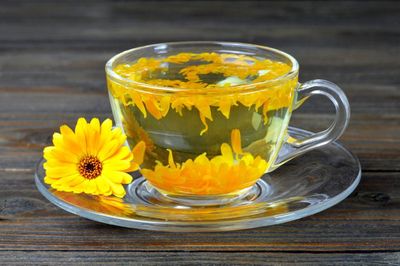Growing Calendula for Tea
Calendula (Calendula officinalis) are loved by gardeners for their vibrant orange and yellow flowers that brighten the back yard from the middle of summer until winter’s first breath. The blossoms send out a siren’s call to bees, hummingbirds, and butterflies. But many people are also growing calendula for tea. Tea made from calendula plants has properties just as exciting as the ornamental value of the plant. Calendula blossoms have long been renowned for their healing properties, and have been found useful for wounds, inflammations of the skin and mouth and sunburns. And the benefits of tea made from calendula are also remarkable. Tea made from calendula is said to soothe the swelling of internal mucous membranes. Sipping calendula tea may help heal gastric ulcers, congested lymph nodes, and sore throat. Some say that it can break a fever by causing a sweat.
How to Make Calendula Tea
The first step toward getting calendula tea benefits is harvesting the plants. Harvesting calendula for tea is like harvesting any other food crop. You need to take the plants at the right time and dry them the right way. Harvesting calendula for tea starts when the first flowers are in full bloom. Don’t wait until they fade. As you pick some, more will grow. As much as possible, act in the morning while the plants are perky. Cut or pinch off blossoms and stems, and leaves too, if you are short of flowers. All foliage seems to have the same healing properties. But flower blossoms are the prettiest. The next step in how to make calendula tea is to dry the harvested plant parts thoroughly. Spread them out on a dishtowel or newspaper in a dry indoor place that doesn’t get direct sun. Turn them from time to time. When the flowers are dry to the point of being crispy, remove the petals and store them away for tea. Add two teaspoons (10 mL.) of dried petals to one cup (240 mL.) of water. Bring it to a boil, then let the tea steep for 10 minutes.
